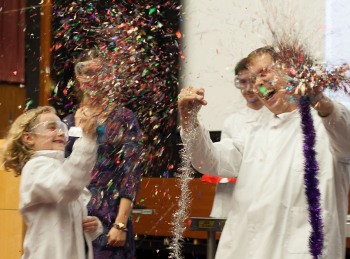Germs, dinosaur bogies and snowflakes: children's lecture explores the world of bugs
Release Date 16 December 2013

Hundreds of children and their families were given a fun and exciting insight into the world of germs on Monday (December 16) at the University of Reading.
Dr Ben Neuman, a microbiologist from the School of Biological Sciences, made viruses and bacteria the centre of attention at the University of Reading's annual children's lecture for 2013.
See more pictures from the lecture here >>>
As well as seeing real-life demonstrations showing how viruses and bacteria work, and being able to volunteer for live experiments on the stage, every young member of the audience went home after picking up a dangerous bug of their own - or a fluffy representation of one, at least.
Dr Neuman, whose research work at Reading centres on coronaviruses, set up experiments with exploding balloons, flasks of bacterial blooms, and a hand washing challenge to help bring the fascinating microscopic world of bugs alive in the imaginations of his young audience members.
Among other fascinating details, the children learnt that while some bugs can make you very sick, others help to keep you alive and have a crucial role to play in the world.
For example, the pseudomonas bacteria helps to form snowflakes, some bugs can be used to fight other more dangerous bugs, and bacteria that lives naturally in your gut is crucial to keep you healthy.
Dr Neuman used computer simulations to show just how tiny viruses are compared to bacteria. He also took his audience on a journey into the microscopic world, back in time 100 million years to talk dinosaur bogies, and described the world's most disgusting network of swimming pools.
University of Reading Vice-Chancellor Sir David Bell, who introduced the lecture, said: "The primary school pupils of 2013 are the scientists, engineers and teachers of 2030. Seeing the children's delight in finding out about germs today serves as a great reminder of the extraordinary capacity young people have to absorb learning and discover new things.
"Ben is a talented scientist who is a passionate advocate for his subject and a first-rate communicator. I certainly learnt something today. But one thing I already knew - great teaching has the power to transform lives."
ENDS
For more information contact Pete Castle at the University of Reading press office on 0118 378 7391 or p.castle@reading.ac.uk.